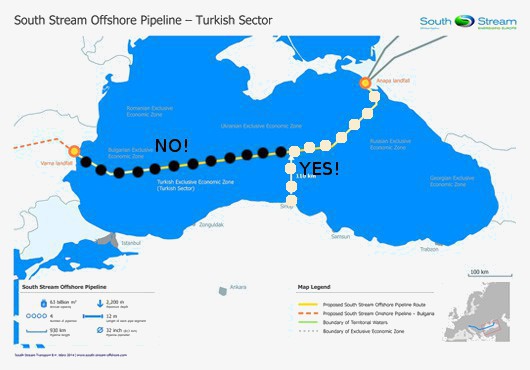The Russia’s decision to abandon the South Stream project has become one of the major events in 2014. This is a message to the leadership of the European Union.
Everything has its limits, including the Brussels’ consistent efforts to stop the project aimed at providing stable energy supplies to Europe. «…taking into account the European Commis-sion’s position, which is not conducive to implementing this project, taking into account the fact that we have only recently received permission from relevant authorities in the Netherlands – granted, it was a positive decision, and taking into account that we still have not received per-mission from Bulgaria, we feel Russia cannot continue implementing this project under the exist-ing circumstances. I mean that we now need to start the construction of this pipeline in the Black Sea, but we cannot do that until we have Bulgaria’s permission. I think it’s clear to everyone that it would be ridiculous to start the construction in the sea, reach the Bulgarian shore and stop», President Vladimir Putin said at his press-conference in Ankara on December 1, 2014.
The EU has failed to come up with an alternative project of its own to provide Europe with gas supplies from the Caspian Sea and Central Asia. Nabucco was doomed from the start while the estimated capacity of TAP (Greece-Albania-Italy) is only 10 billion cubic meters a year – six and a half times less in comparison to the South Stream. The population of Europe has become a hostage of this policy. In addition to that, Europeans fall prey to the EU’s policy on Ukraine. Ki-ev let know that it intends to continue using the Russian transit gas to satisfy its needs. There are financial losses incurred as the South Stream is scrapped. According to preliminary estimates, the foreign companies involved in the South Stream project may suffer losses equal to $2, 8 billion to be allegedly compensated by the European Commission and the EU anti-crisis funds.
The second recipient of the message is the government of Bulgaria which is absolutely vulnerable to outside pressure while tackling the issues of national importance. This affir-mation is confirmed by its decision to block the construction of South Stream on Bulgarian terri-tory. Neither Austria, an EU member-state, nor Hungary, the country the US has imposed sanc-tions on, nor Serbia, which is under pressure from the United States and the European Union, have taken such a step which is tantamount to committing a suicide as Europe is deprived of sta-ble energy supplies.

The third recipient is Turkey. The EU anti-Russia policy makes Ankara the biggest winner. Turkey is to get 3 billion cubic meters more. A promising project is agreed on – a pipeline with the capacity of 63 billion cubic meters, the same as the South Stream, will be built to stretch from Russia to Turkey. «…if it is deemed expedient, we can build an additional gas hub for the South European consumers on Turkish territory, near the border with Greece,» President Putin said at the press-conference. Turkey is the second largest importer of Russian gas after Germany. Gas is transported to Turkey from Russia via the «Western corridor» and the Blue Stream. On his part Turkish President Recep Tayyip Erdogan emphasized at the talks with his Russian counterpart that Turkey gets 50% of its gas supplies from Russia. He said the Russian gas deliveries are important for Turkish economy. Alexey Miller, Chairman of the Gazprom Management Committee and Mehmet Konuk, Chairman of the Board of Directors of Botas Petroleum Pipeline Corporation, signed in Ankara a Memorandum of Understanding on constructing an offshore gas pipeline across the Black Sea towards Turkey. The annual capacity of the pipeline will amount to 63 billion cubic meters with 14 billion cubic meters going to Turkish consumers and nearly 50 billion cubic meters transported to the border between Turkey and Greece where a delivery point is to be built.
New contradictions emerge to affect the relations between the European Union and Turkey. The creation of new important hub at the Greek border with supplies coming from Rus-sia will make the EU face Turkey, a much tougher negotiator than Moscow. The talks will be affected by the fact that Brussels blocks the Turkey’s EU membership.
Günter Verheugen, former European Commissioner for Enlargement, said that the relation-ship with Turkey was perhaps the most difficult problem for the European Union. According to him, making Turkey a full-fledged member would once and for all make the EU a global actor, something the organization is not ready for. The redirection of the gas flows form the South Stream to Turkey will turn Ankara into a global energy player. Are Europeans ready for that?
Finally, the Moscow’s message is also addressed to the government of Ukraine. Many a time Kiev said there was no need for the project to be implemented. Ukraine called for shelving the pipeline going around the Ukraine’s territory. Now it’s up to Ukraine to take practical steps to ensure the EU's energy security.









